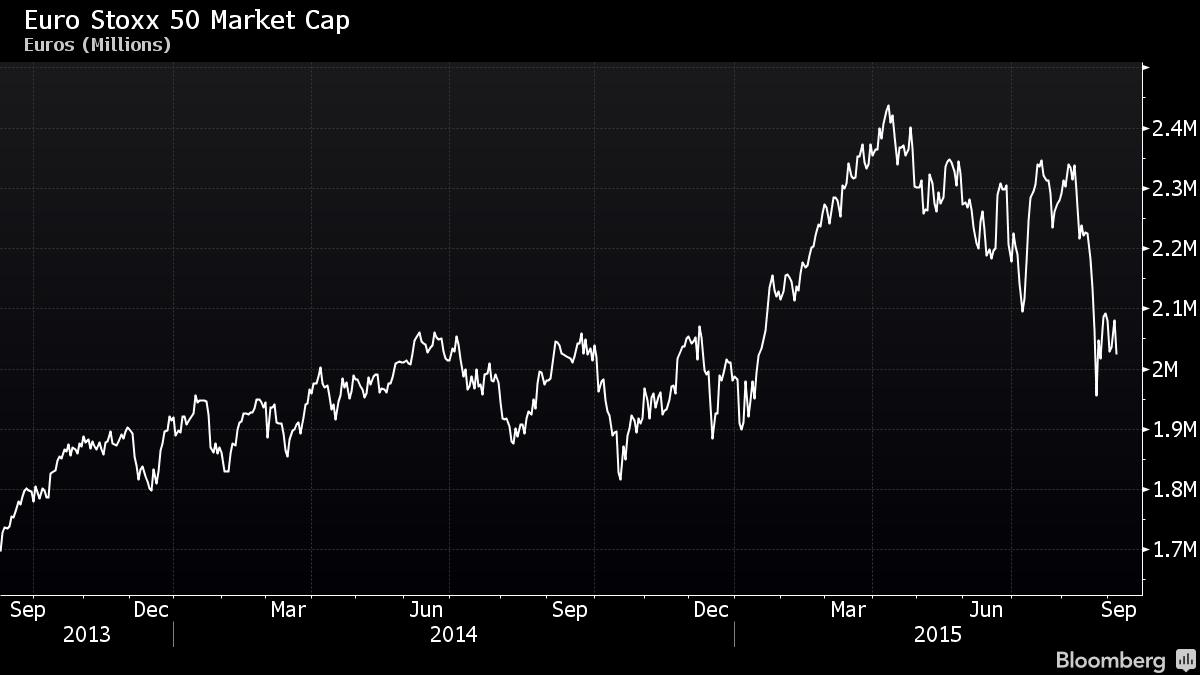
ECB QE fails to improve sentiment toward equities - Chart
The European Central Bank’s plan to pour cash into the financial system by purchasing bonds was supposed to ignite the same celebration of risk-taking it did in the U.S. six years ago. However, the opposite has happened, with the climax in as much as $526 billion of share values being washed away last month.
The failure of European quantitative easing to improve sentiment toward
equities is a troubling sign to bulls as markets from Shanghai to New
York endure their worst selloffs since 2011. Rather than set Europe
apart as a shelter, Draghi’s program has been marginalized in the stock
market by events such as Greece’s credit standoff.

“People get very nervous when they feel there are no more policy levers left,” Graham Secker, Morgan Stanley’s head of European equity strategy, said to Bloomberg, adding that at the moment, investor confident is very low, and everyone wants to avoid a risk. "They don’t see who is going to ride to the rescue.”
Morgan Stanley is among those telling investors to buy the dip. Secker predicts stock prices will catch up with earnings once confidence returns, rather than the other way round.
As for economy, Europe is making progress. Unemployment in the region unexpectedly dropped, while German manufacturing expanded at a faster pace. Economists predict Europe’s gross domestic product to grow 1.5 percent this year, the most since 2011. And analysts still predict profits for companies in the currency bloc will increase 12 percent this year.
However, the figures are doing little to help stocks. In the latest rout, valuations in the Euro Stoxx 50 fell to 12.4 times projected earnings, compared with 15.3 when Draghi’s program started in March.
David
Hussey, head of European equities at Manulife Asset Management in
London, noted that Europe reminds the region that catches everyone's cold.
“The economic recovery and bounce in corporate profits that the
U.S. has seen in the last five years has not yet occurred in Europe. It
will always be heavily influenced by events globally,” he said.
Teis Knuthsen, chief investment officer at Saxo Bank A/S’s
private-banking unit in Hellerup, Denmark, noted that the situation is quite confusing, as there is nothing on the economic or earnings horizon that looks bad for Europe.
“The selloff was not economic stress, it was financial stress. Now a lot of good companies look far too cheap if you consider that not much has changed on the fundamental side.”
The threat is that they stay cheap with the Federal Reserve bracing for increasing interest rates even after the International Monetary Fund said the outlook for global expansion is worse than it anticipated less than two months ago. Traders are pricing in a 30 percent chance rates will rise this month.
Luca Paolini, Pictet Asset Management’s chief strategist in London, said that China is threatening to hamper global growth at a time when the Fed is intending to tighten, and it is not a good environment at all.
“The ECB can’t hold up the recovery on its own, and fundamentals have definitely deteriorated. European earnings aren’t safe from this.”


